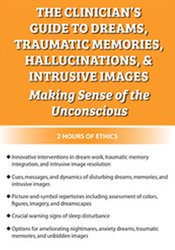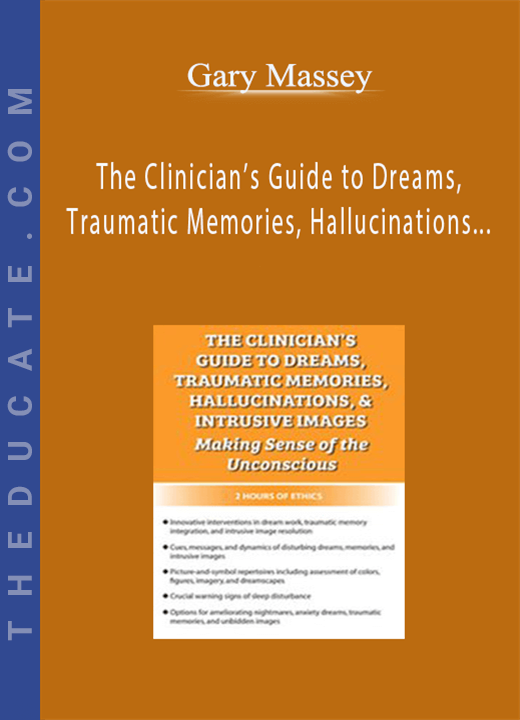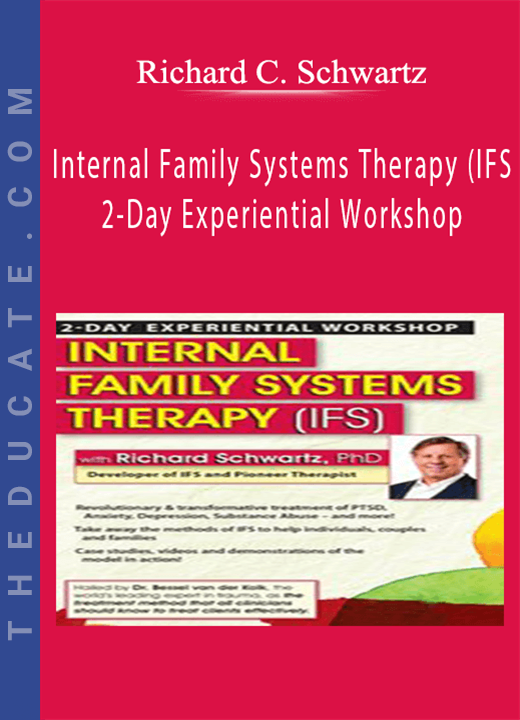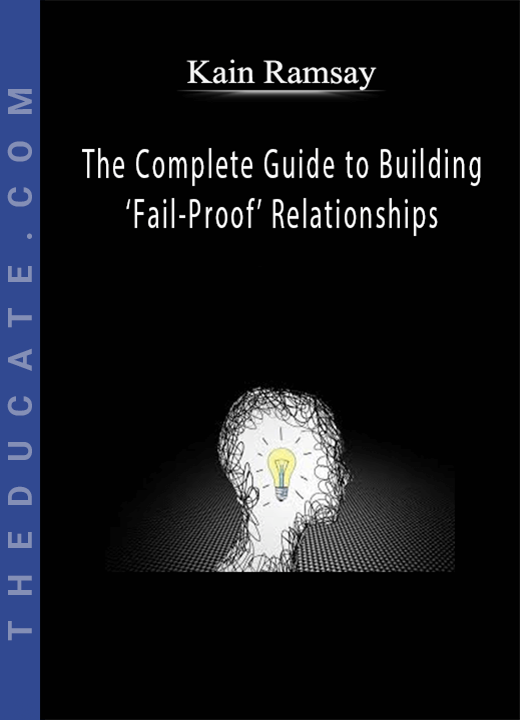Description

- Faculty:
- Gary Massey
- Duration:
- 5 Hours 56 Minutes
- Format:
- Audio and Video
- Copyright:
- Jun 30, 2017
- Stages of sleep, brainwaves, and sleep-wake cycle
- Basic neurobiology and brain functioning during dreaming, traumatic memory, and waking imagery with updated research findings
- Psychological models of the human conscious, pre-conscious, personal unconscious, and collective unconscious
- Gender and cultural/ethnic influences and considerations
- Guidelines, formats, and methods at critical junctures of treatment and beyond
- Determining and identifying precursors, stressors, cues, and triggers
- Dream, traumatic memory, hallucinations, and intrusive image dynamics
- Freudian, Adlerian, Ericksonian, Jungian, Redecision/TA/Gestalt, Senoi and Creative Problem-Solving theories and approaches
- Intervention and modification guidelines, methods, and techniques
- Indicators of improvement, health, wellness, compensation, decompensation, illness, change, resolution, and realignment
- Application to individual and group psychotherapy
- Addressing sleep disturbance and disorders
- Collaborative development and implementation
- Precursors and triggers
- Cues and warning signs
- Practical coping skills
- Patient-family education
- Necessary support person(s) involvement/debriefing
- Social resource enhancement
- Practical contextual guidelines
- Ethical challenges
Gary Massey – The Clinician’s Guide to Dreams, Traumatic Memories, Hallucinations, and Intrusive Images: Making Sense of the Unconscious
Description
Reflections and Traces of the Unconscious
Dream work and therapeutic image modification is an often neglected yet valuable inroad and component to healing, wellness, and effective treatment. You don’t need a breakdown of the mental health statistics to know that disturbing dreams, PTSD flashbacks, traumatic memories, hallucinations, obsessive fantasies, and unbidden intrusive images frequently impact and contribute to personal decompensation, mood/thought dysregulation, at-risk behavior, and interpersonal disturbance. As mental health practitioners, we must lead the way to properly assess, treat, and intervene as necessary with our patients and at-risk clients; yet many mental health professionals are not fully prepared or thoroughly trained for such crucial tasks.
This in-depth course provides the latest research and evidence-based therapeutic tools for effectively intervening with your clients’ dreams, traumatic memories, and unbidden images. Learn innovative and proven therapeutic assessment and intervention methods for effective psychological triage, psychoeducation, and practical daily life coping skills. In conjunction with fine-tuning professional dream work and therapeutic imagery processes and methods needed to meaningfully address and treat your clients, you gain two hours of ethics by examining clinical practice challenges, mistakes, and scenarios. Workshop participants are encouraged to bring their own or a patient’s intriguing dreams or disturbing images for workshop training in more effective dream work and therapeutic imagery processing and integration, while of course maintaining anonymity without specific identifiers.
Handouts
| Manual – The Clinician’s Guide to Dreams, Traumatic Memories, Hallucinations, and Intrusive Images (9.69 MB) | 161 Pages | Available after Purchase |
Outline
DREAMS, TRAUMATIC MEMORY, DISTURBING IMAGES & BRAIN FUNCTIONING
RISK ASSESSMENT
THEORIES & INTERVENTION APPROACHES
EVIDENCE-BASED TREATMENT METHODS & INTERVENTIONS
TREATMENT & WELLNESS RECOVERY PLANS
ETHICAL DILEMMAS
Group case studies exploring pivotal treatment junctures, risk indicators, intervention options, recommendations, and follow-up
Faculty
Gary Massey, Ph.D., LCSW, LPC-S, LMFT-S. Related seminars and products: 1
Gary Massey, Ph.D., LCSW, LPC-S, LMFT-S., is a Texas Board Approved Supervisor of LCSW, LPC, and LMFT, and is a National Registry Member of Certified Group Psychotherapists. With an extensive background in mental health treatment spanning more than 30 years, Dr. Massey has worked in private practice, group practice, community mental health, prison and, psychiatric inpatient and outpatient treatment settings. He also worked over a decade as a clinical supervisor and manager. Currently, he specializes in professional consultation, supervision, and clinical training in the Dallas/Fort Worth area, and across the United States.
Dr. Massey’s doctoral dissertation involved extensive research on early memories, perceived family environment, and the sexually traumatic distress of abuse for middle-class, professional women. Dr. Massey has provided Professional Dream and Imagery Psychotherapy workshop training for over 20 years in numerous mental health contexts. Dr. Massey also teaches a course for clinicians on treating suicidal and homicidal patients.
Speaker Disclosures:
Financial: Gary Massey is the Director of Clinical Services of Dallas Behavioral Healthcare Hospital. He receives a speaking honorarium from PESI, Inc.
Non-financial: Gary Massey is a member of the American Group Psychotherapy Association; and the National Registry of Certified Group Psychotherapists.






10 reviews for Gary Massey – The Clinician’s Guide to Dreams, Traumatic Memories, Hallucinations, and Intrusive Images: Making Sense of the Unconscious
There are no reviews yet.